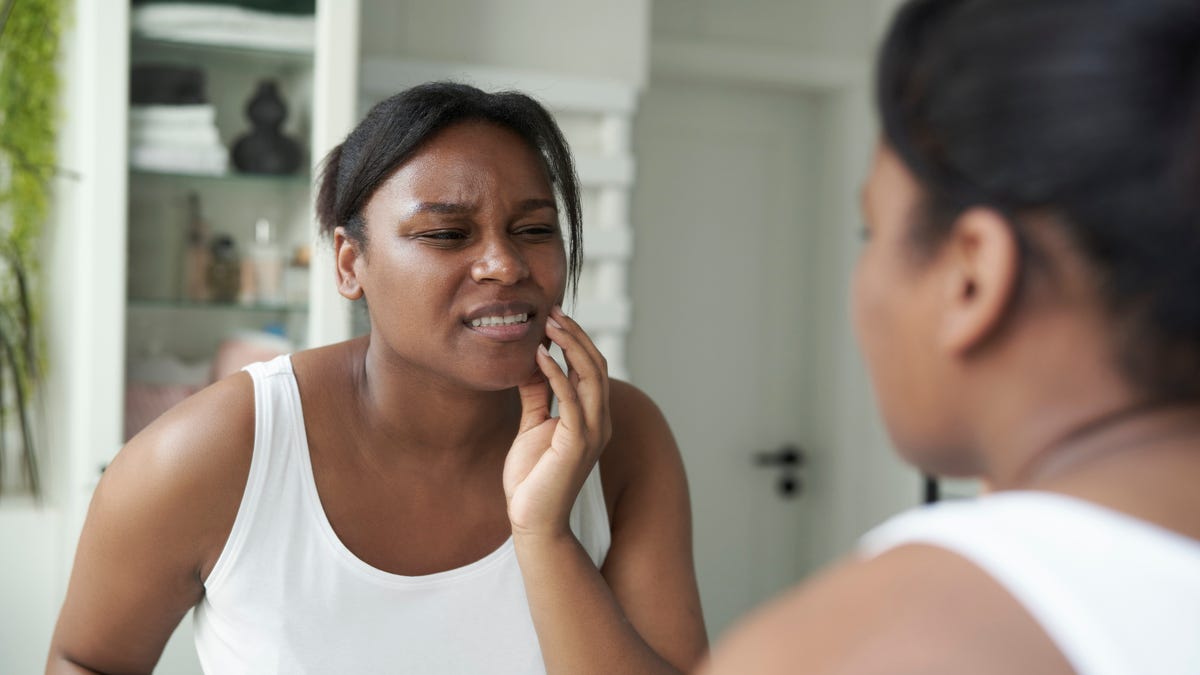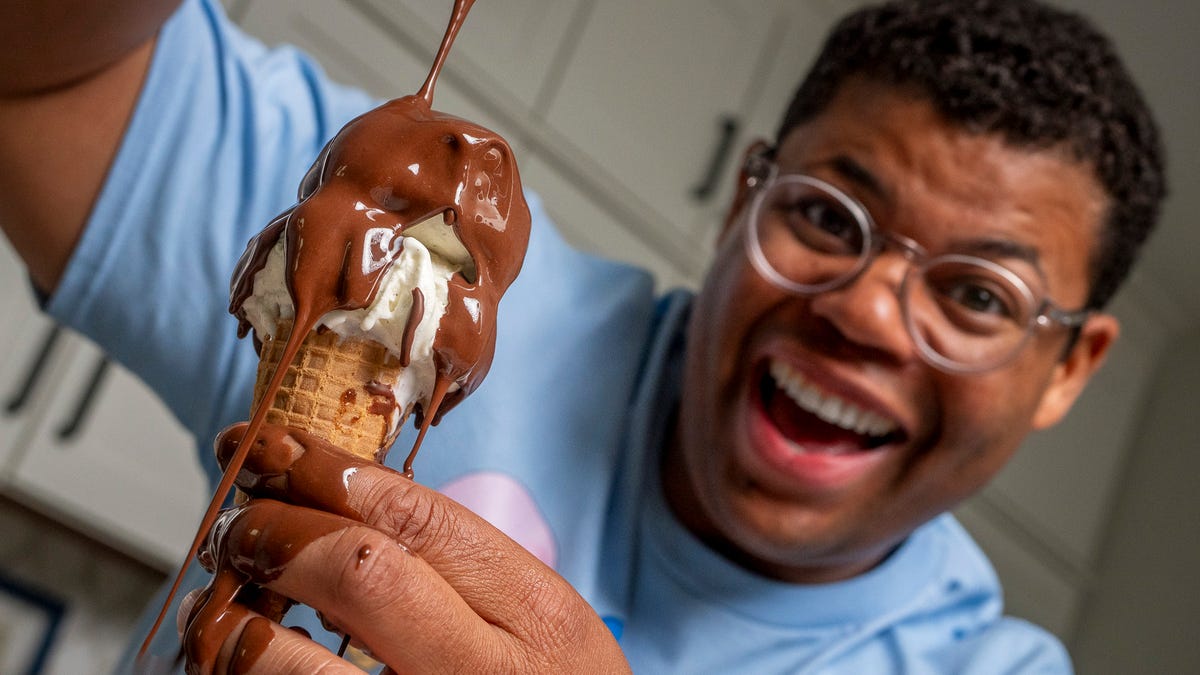Florida joins Utah in banning fluoride from public water systems
Florida is the second state to take steps toward ending fluoridation in public water systems. Utah became the first in March.
Scripps News
If you notice your teeth are looking a little worn down, or you’re waking up with jaw pain after what should’ve been a night of restful sleep, have you considered whether you’re grinding your teeth?
Bruxism is a term that’s used to describe the habitual action of excessive clenching or grinding of the teeth, says Dr. Shannon Kaiser, a general dentist at Mercy Medical Center in Baltimore. “We see this condition take place during waking hours, but more commonly at night, during the subconscious time,” she says. Often, people don’t even realize they’re doing it.
There are lots of reasons why someone could be grinding their teeth – from stress and anxiety, to taking certain medications. But how do you manage bruxism? Here’s what experts need you to know.
What is bruxism?
“Bruxism is repetitive jaw muscle activity that’s characterized by clenching or grinding of the teeth, and/or by bracing or thrusting of the mandible (lower jaw),” says Dr. Michele Schultz, a board-certified orofacial pain specialist and assistant professor in the departments of diagnostic sciences and restorative dentistry at Rutgers School of Dental Medicine.
There are a few telltale signs of bruxism. “A general dentist is most likely going to suspect that a patient is clenching or grinding when they see significant tooth wear (called attrition or abrasion),” says Dr. Seema Kurup, a board-certified orofacial pain and temporomandibular disorders specialist and an associate professor and division chair of oral medicine and orofacial pain at the University of Connecticut School of Dental Medicine.
As bruxism progresses, patients are likely to complain about tooth sensitivity. And beyond the obvious tooth wear that a general dentist could observe, repetitive actions of the jaw muscle activity could cause someone to experience muscle pain. So it’s not uncommon for some people to notice pain or stiffness in the jaw when they wake up, especially if they have sleep bruxism or if they experience jaw pain during the day (especially due to stress), Kurup says.
If you’re jaw clenching for an extended period of time, it could cause fractures in your teeth, or contribute to temporomandibular disorders, says Kaiser.
Why am I grinding my teeth?
Chronic teeth grinding might not be the result of one particular entity, but rather a combination of factors, says Kurup. Here are a few possible reasons why you could be grinding your teeth.
- You’re experiencing a lot of stress and anxiety. One of the main reasons behind bruxism is stress and anxiety, says Kaiser. In her practice, Kaiser has noticed when patients are exhibiting signs of teeth grinding (such as worn-down teeth) and complain of jaw pain, they also tend to mention they’re going through a stressful period – whether they’re in the middle of final exams, or transitioning into a new job.
- Certain lifestyle factors. Patients that drink a lot of caffeine, have a tendency to drink alcohol regularly or smoke cigarettes are more likely to have bruxism, Kaiser says.
- You take certain medications. Certain SSRIs, SNRIs and tricyclic antidepressants have been linked with grinding and clenching the teeth, Schultz says.
- You live with a chronic health condition. Bruxism has been associated with a number of chronic health conditions, including Parkinson’s disease, encephalitis, epilepsy, traumatic brain injury and hyperthyroidism, says Schultz. It’s also possible that bruxism could point to an underlying sleep disorder, such as sleep apnea or insomnia, says Kurup.
How to stop teeth grinding, how to stop clenching jaw
If your dentist says you are clenching and grinding your teeth, there are a few potential solutions:
- Use a night guard. Lots of patients may find relief from teeth grinding by using a custom-made night guard, says Kaiser. And there are a few other added benefits: A night guard protects the teeth and temporomandibular joint and preserves previous dental work, she says.
- Take steps to manage stress and anxiety. It’s possible that seeing a therapist for anxiety and stress, and practicing mindfulness techniques, could help treat the psychosocial aspect of bruxism. If you catch yourself clenching your teeth, try the following exercise: “Put your tongue to the roof of your mouth, relax your jaw and take a breath,” says Schultz.
- Avoid stimulants. Because smoking, caffeine and alcohol have been associated with bruxism, scaling back or cutting out these habits could help manage bruxism, says Kurup.
- Consider Botox injections. The buccinator and masseter muscles control the strength of our jaw. When Botox is injected into those areas, it relaxes the muscles’ ability to clench, says Kaiser. “While Botox won’t eliminate bruxism, it reduces the function of muscles to a certain degree,” Kurup says.
- Take a muscle relaxer. For patients experiencing acute pain, taking a muscle relaxer for a brief period of time could help break the habit, says Schultz.
- Treat a sleeping disorder. If it’s been identified that your jaw clenching is actually the result of an underlying sleep disorder (such as sleep apnea), treating the sleep disorder (under the supervision of a sleep medicine specialist) could help correct the teeth grinding problem, says Schultz.
“While it’s possible that someone could grow out of bruxism (if it is purely habitual), if you’ve been clenching your jaw for many years and when associated with multiple other conditions, it could be difficult to completely control it,” says Kurup. “At that point, it’s more so about mitigating symptoms and signs. Patients should be educated that ‘management’ can often become the cure,” she says.
If you’re concerned that you’re grinding and clenching your teeth, pay a visit to your dentist, who can assess your symptoms and offer potential treatment options, says Schultz.










